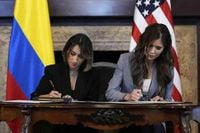U.S. Homeland Security Secretary Kristi Noem visited Colombia on Thursday, March 27, 2025, as part of a tour of three Latin American nations aimed at addressing critical issues of immigration, crime, and deportation. This visit occurs against a backdrop of strained relations between the Trump administration and the Colombian government, which has traditionally been one of the United States' closest allies in the region.
Tensions escalated in January 2025 when the Colombian government expressed reluctance to accept flights carrying immigrants deported from the U.S. This friction set the stage for Noem's visit, which included meetings with Colombian officials to discuss collaborative efforts to enhance security and manage migration effectively.
During her visit, Noem met with Colombian Foreign Minister Laura Sarabia. She described their discussions as “frank and candid,” focusing on the pressing matters of deportations and crime. “We’re committed to working hand-in-hand with our Colombian partners to enhance not only border security but also that we will support the enforcement of our criminal laws,” Noem stated, underscoring the U.S. commitment to strengthening bilateral cooperation.
Sarabia echoed these sentiments, emphasizing the importance of ensuring that “the human rights and dignity of migrants are actually respected.” This commitment to human rights was further solidified when the two officials signed an agreement aimed at expanding the sharing of biometric data for law enforcement purposes. This agreement is expected to facilitate more efficient cooperation in managing migration and combating crime.
Later in the day, Noem met with Colombia’s President Gustavo Petro, where they discussed issues surrounding security, drug trafficking, and the repatriation of Colombians. While specific details of the meeting were not disclosed, it is known that both leaders have divergent views on key issues, particularly regarding crime and the role of the U.S. government in Latin America.
Noem's visit to Colombia stands in stark contrast to her previous stop in El Salvador, where she met with President Nayib Bukele. Bukele has garnered admiration from right-wing circles in the U.S. for his aggressive stance against gangs. During her time in El Salvador, Noem toured a massive prison complex housing alleged gang members, many of whom are Venezuelans deported by the U.S. government under controversial circumstances.
In Colombia, the backdrop of Noem's discussions is significant. President Trump had previously threatened tariffs and sanctions against Colombia in response to Petro's refusal to accept deportation flights. However, a deal was eventually reached, allowing deportations to resume, albeit with Petro urging migrants to return home voluntarily.
“Today we have signed a statement of intent for biometric cooperation, and it will reaffirm our strong, resilient, and enduring partnership,” Noem remarked during her visit. The agreement aims to bolster regional security systems and disrupt the activities of criminal organizations that threaten both nations.
As Noem prepares for her next stop in Mexico, where she is scheduled to meet with President Claudia Sheinbaum, the implications of her discussions in Colombia remain critical. The Mexican government has been working diligently to negotiate with the Trump administration to mitigate the impact of recently announced tariffs on auto imports, which were set at 25% by Trump on March 26, 2025.
In summary, Noem's tour of Latin America highlights the complexities of U.S. foreign policy in the region, particularly as it relates to immigration and crime. The contrasting approaches of the leaders she meets—ranging from Petro's more progressive stance to Bukele's hardline tactics—illustrate the diverse political landscape of Latin America and the challenges that lie ahead for U.S. diplomacy.
The outcomes of these meetings will likely have lasting implications for U.S.-Latin American relations, especially as the Trump administration seeks to navigate a path forward amidst rising tensions and differing political ideologies. As the situation continues to evolve, the focus will remain on how these discussions translate into actionable policies that respect human rights while addressing the pressing issues of migration and security.






